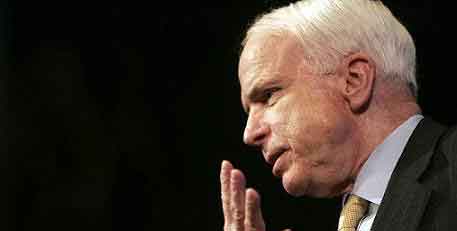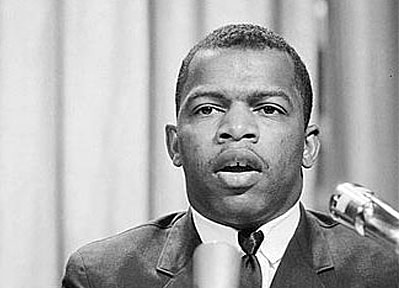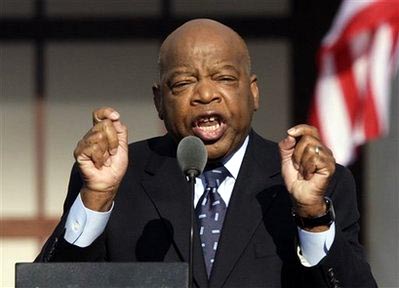“This time, the FWP could begin by documenting the ground-level impact of the Great Recession; chronicling the transition to a green economy; or capturing the experiences of the thousands of immigrants who are changing the American complexion. Like the original FWP, the new version would focus in particular on those segments of society largely ignored by commercial and even public media.” In the wake of the turmoil engulfing the newspaper industry at the moment (see also: The Wire, Season 5), journalist Mark Pinsky argues in TNR for a 21st century revival of the Federal Writers’ Project. Given the woeful state of the academic job market during this current downturn, I bet there are quite a few historians out there who’d give this a “Huzzah!”
Category: History
Escape from New York.
“On an island under military occupation at the edge of an empire, the armed forces of a global superpower detain hundreds and sometimes even thousands of allegedly unlawful combatants. The powerful nation consigns the detainees to a legal limbo, subjecting them to treatment that critics around the world decry as inhumane, unenlightened, and ultimately self-defeating. That may sound like a history of Guantanamo. Yet the year was 1776, the superpower was Great Britain, and the setting was New York City. The ‘unlawful’ combatants were American revolutionaries.”
in a mixed review of Edwin Burrows’ Forgotten Patriots, friend and Columbia prof John Witt notes “eerie” parallels between Guantanamo Bay and revolutionary-era Manhattan, and offers choice advice for President-elect Obama. “To succeed, he will have to reunite the twin American traditions of interest and idealism. They are traditions his predecessor tore apart, but they are the true legacy of the Revolution.“
Thoughts after the Quake.

Thus was the freewheelin’ Bob Dylan’s happy reaction to Obama’s election Tuesday night. (As you may remember, he publicly backed the senator in June.) For many others, including yours truly, the feeling of the evening might best be summed up by one of Dylan’s esteemed contemporaries, Leonard Cohen: “Hallelujah, Hallelujah, Hallelujah, Halleloooooojah!“
For the first time since 1994, we have a Democratic president and a safely Democratic Congress. For the first time since 1964, we have a Democratic president entering office with a commanding mandate from the people. For the first time since…well, ever, we’ve reaffirmed our founding principles by choosing an African-American to lead us into the future.
I don’t want to overplay the “first black president” thing, because that’s not at all why we chose Sen. Obama. Still it must be said: With this election, we have shown the world — and ourselves — anew that the American ideal isn’t just a convenient myth, but a vision of the good that many of us still aspire to create every day. In the words of Cornel West, “To understand your country, you must love it. To love it, you must, in a sense, accept it. To accept it as how it is, however is to betray it. To accept your country without betraying it, you must love it for that in it which shows what it might become. America – this monument to the genius of ordinary men and women, this place where hope becomes capacity, this long, halting turn of the no into the yes, needs citizens who love it enough to reimagine and remake it.” And so we have, in a way the founders of our American experiment 221 years ago could barely have imagined.
Meanwhile, even with crooks like Ted Stevens and Norm Coleman still floating for the moment, our old friends the Republicans are now not only in full rout, but appear to be set to tear each other’s throats out in assigning blame for their repudiation at the polls. (Expect several further symposia of conservative hand-wringing, and a lot more intraparty shivving, along the lines of “Palin thinks Africa is a country,” in the weeks to come.) This gang will regroup — they always do — but for now the GOP has enough problems of their own to keep them busy. And, whatever ever they manage to accomplish as the loyal(?) opposition, it seems a safe bet that the Conservative Era that began with the defeat of Barry Goldwater in 1964 has now officially coughed up its last in 2008, with the defeat of fellow Arizonan John McCain.
By the way, also joining the Republicans on the road to oblivion Tuesday night, alas, was my old laptop, a victim of post-return celebratory spillage. (Jamesons: Good for Jimmy McNulty and jubliant Dems, Bad for computer hardware in and around the television area.) Normally, inadvertently frying my growing-ancient-but-generally-reliable PC would’ve completely ruined my day. As it was, I took the news about like Baxter eating the whole wheel of cheese: “How’d you do that? Heck, I’m not even mad; that’s amazing.” (And, fortunately, the hard drive, and the dissertoral files therein, were salvageable regardless.)

One much more depressing skeleton at the feast Tuesday night, about which Ted at Gideonse Bible, Chris at DYFL, and others have written eloquently: the passage of the idiotic Proposition 8 in California, which seemingly won with quite a bit of help from first-time Obama voters. It’s irredeemably sad not only that a day that saw so much progress was marred by Prop 8 and its like around the country, but that so many of the voters who helped strike a fatal blow against enduring racial prejudice at the national level seemingly had no qualms about encoding anti-gay bigotry into the California constitution.
Perhaps I’m dense, but I fail to understand how the institution of marriage could somehow be threatened by the state recognizing the unions of same-sex couples, particularly in a day and age when so many straight folk (myself included) have already had marriages that failed. (As my old boss used to say of the thrice-married Bob Barr back when he supported the Defense of Marriage Act: “Which marriage is he defending?”) By the way, particularly galling on the Prop 8 front, I think, is the strong imposition of the Mormon church into the battle on the side of the anti-gay zealots. One would think, of all people, the Mormons might have some sense of the damage that can be wrought by the state involving itself in stringent definitions of marriage. But, no, apparently what was good for two ganders in the eyes of the Mormons isn’t good for the goose. For shame.
Still, the Prop 8 debacle notwithstanding (I have every faith that within a decade, that law will seem as knee-jerk, narrow-minded, and embarrassing as it in fact is), Tuesday was otherwise a great night for America. What it now befalls us to remember is that, while we should savor them while we can, the path of progress before us will likely offer few such moments of jubilation in the months and years ahead. When it comes to change, it really is “uphill all the way.”
Given the economic and diplomatic travails already before President-elect Obama, he’ll have his work cut out for him from jump street. And those out there old enough to remember President Clinton’s first days in office, and how quickly things seemed to go south then (the sanity-restoring ’93 budget bill notwithstanding) will know that a Dem president and Dem Congress is no guarantee of progressive legislation in the offing. We won’t see the change we want — and voted for — without maintaining steady and unyielding pressure on all the machinery of government in the months and years to come. Now is not the time to sit back and let our new president try to do all the heavy lifting, but to stay involved as citizens and keep the progressive ball moving forward. (And, hey, keeping one’s head in the game may help to mitigate those postpartum existential crises The Onion warned us about.)
 In an election held eighty years ago (i.e. in the living memory of one Ann Nixon Cooper), Herbert Hoover, the longstanding Secretary of Commerce widely revered as “the Great Engineer” and “the Great Humanitarian,” decisively defeated Al Smith, the Catholic Governor of New York. “Given a chance to go forward with the policies of the last eight years,” Hoover had promised in his nomination speech, “we shall soon with the help of God be in sight of the day when poverty will be banished from this nation.” And, while he obviously had his detractors, many across the country viewed Hoover as a miracle-worker who could singlehandedly steer the country to these new great heights. “We were in a mood for magic,” journalist Anne O’Hare McCormick wrote of the Hoover inauguration. “We summoned a great engineer to solve our problems for us; now we sat back comfortably and confidently to watch the problems being solved.“
In an election held eighty years ago (i.e. in the living memory of one Ann Nixon Cooper), Herbert Hoover, the longstanding Secretary of Commerce widely revered as “the Great Engineer” and “the Great Humanitarian,” decisively defeated Al Smith, the Catholic Governor of New York. “Given a chance to go forward with the policies of the last eight years,” Hoover had promised in his nomination speech, “we shall soon with the help of God be in sight of the day when poverty will be banished from this nation.” And, while he obviously had his detractors, many across the country viewed Hoover as a miracle-worker who could singlehandedly steer the country to these new great heights. “We were in a mood for magic,” journalist Anne O’Hare McCormick wrote of the Hoover inauguration. “We summoned a great engineer to solve our problems for us; now we sat back comfortably and confidently to watch the problems being solved.“
For his part, Hoover was less sanguine about his prospects. “They have a conviction that I am some sort of superman, he fretted. “If some unprecedented calamity should come upon the nation…I would be sacrificed to the unreasoning disappointment of a people who expected too much.“
Who among us think Hoover a superman now? History doesn’t stop with a war or an election or the collapse of a governing ideology, be it Communism or Conservatism. It grinds inexorably on, always uncertain, always equal parts danger and opportunity, and all too often deeply laced with irony — Time and time again in our American story, nothing succeeds like abject failure, and nothing fails like a great success. So let’s not rest on our laurels by any means: The election of 2008 was a campaign hard-fought and hard-won, but the battle continues, and in many ways the real work before us is only now just beginning.
Let us look to navigate the turbulent waters ahead with a deep and abiding faith in our new captain, but also with our own eyes to the sea.
(Presidents pic via Hal at Blivet and Patrick at Supercres.)
The Listener. | The Caregiver.

“With optimism, you look upon the sunny side of things. People say, ‘Studs, you’re an optimist.’ I never said I was an optimist. I have hope because what’s the alternative to hope? Despair? If you have despair, you might as well put your head in the oven.”
Popular historian, talk show host, and chronicler of the American story Studs Terkel, 1912-2008. “I’ve always felt, in all my books, that there’s a deep decency in the American people and a native intelligence — providing they have the facts, providing they have the information.“
Update: “She was the cornerstone of our family, and a woman of extraordinary accomplishment, strength, and humility. She was the person who encouraged and allowed us to take chances. She was proud of her grandchildren and great-grandchildren and left this world with the knowledge that her impact on all of us was meaningful and enduring. Our debt to her is beyond measure.” This evening brings sad news of the passing of a lady with whom Terkel could’ve spent many joyous hours, I’m sure: Madelyn Dunham, grandmother to Barack Obama, 1922-2008.
Good Germans | Poor Little Rich Boy | Rusty Fan.
In the trailer bin of late:
McCain the (Bull) Moose-Hunter?
“When T.R. spoke of ‘swollen fortunes’ and ‘malefactors of great wealth,’ socialism was a genuine force in American politics, perceived by many to pose a serious threat to the social order. When T.R. first called for a ‘graduated income tax’ in his 1907 State of the Union, he was proposing a measure that the Supreme Court had ruled unconstitutional. Indeed, the federal income tax struck down by the Court wasn’t even ‘graduated,’ or progressive; it was a flat-rate tax.” One from a few days ago that Ted at The Late Adopter just reminded me of: As Slate‘s Tim Noah aptly points out, John McCain can either continue to decry Obama’s purported “socialist” tendencies, or he can continue to claim Teddy Roosevelt is his hero, but he cannot plausibly continue to do both.
At the very least, it would seem McCain, what with his coterie of lobbyist attendants, has either never read — or is flagrantly ignoring — TR’s “New Nationalism” speech: “There can be no effective control of corporations while their political activity remains. To put an end to it will be neither a short nor an easy task, but it can be done” (See also one of my favorites: “The prime problem of our nation is to get the right type of good citizenship, and, to get it, we must have progress, and our public men must be genuinely progressive.)”
The Unsinkable Movement.

You already know the story by now. Still, at the risk of further wallowing in (highly dangerous pre-election) schadenfreude, here’s another timely obit for the conservative movement, by Salon‘s Gary Kamiya. Now I know that, no matter how good the polls look, linking these sorts of pieces before the returns are in (one week to go!) is a highly dubious proposition, karmically speaking. As Norman Wilson rightly warned Mayor Carcetti of Clay Davis, “You don’t dance on Clay’s grave until you’re sure the motherf**ker’s dead.”
Still, given that the McCain, Palin, and Dubya camps are now all openly shivving each other for spots on the lifeboats — Team McCain has now taken to calling the governor a “diva” and a “whack job,” Palin herself is now apparently eyeing 2012 (ooh, please run!), and everybody is naturally running from Dubya — the Titanic metaphor, however hoary a cliche, seems a safe bet regardless.
He knows Hoover, and Hoover is no GWB.
“Even revisionist historians who view Hoover kindly concede that his was a failed presidency. Still, it’s unfortunate that commentators and politicians are employing ‘Hoover’ as an epithet for inaction. His White House tribulations consumed only four of more than 90 years studded with extraordinary achievements- — as Great Engineer, as World War I Food Czar, and, above all, as Great Humanitarian.” In light of recent events, esteemed historian William Leuchtenberg rides to the rescue of the Great Engineer, and attempts to set the record straight on comparisons of Dubya to Herbert Hoover. “In contrast to George W. Bush,” he concludes, “President Hoover moved in unprecedented ways to cope with economic calamity.“
Astride the Mad Elephant.

“At McCain-Palin rallies, the raucous and insistent cries of “Treason!” and “Terrorist!” and “Kill him!” and “Off with his head!” as well as the uninhibited slinging of racial epithets, are actually something new in a campaign that has seen almost every conceivable twist. They are alarms. Doing nothing is not an option…What makes them different, and what has pumped up the Weimar-like rage at McCain-Palin rallies, is the violent escalation in rhetoric, especially (though not exclusively) by Palin…By the time McCain asks the crowd “Who is the real Barack Obama?” it’s no surprise that someone cries out ‘Terrorist!’ The rhetorical conflation of Obama with terrorism is complete. ” — Frank Rich, QFT, October 12, 2008.
It’d be funny, if it weren’t so frightening, to see this current version of the GOP end as it began. Forty years after the New Right that coalesced behind Goldwater and Reagan saw its first national victory with the election of Richard Nixon on a, ahem, “law and order” ticket (in no small part thanks to the assassination of RFK), the conservative movement that gave us Helms, Falwell, Reagan, Gingrich, and Dubya is collapsing back into its original base state: a seething, festering cauldron of paranoia, race-baiting, inarticulate rage, and eminently justifable, easily exploitable working-class grievance.
And, with no other game-changer left in the Atwater playbook, McCain the mythical maverick, his “Sarracuda” running mate, and the sad coterie of (lily white) GOP deadenders about them have now taken to doing the very opposite of “Putting Country First” — Instead, they’re stirring this pot, hoping the vile, unstable, and extremely combustible concoction therein can somehow propel them into the White House. Call it the Joker strategy: With no other way to win at this point, the McCain campaign is banking on the American people getting so scared, confused, and enraged by their lies and name-calling that we’ll up and decide to blow each others’ ferries out of the water. (In fact, now that I think about it, I guess that might go a long way towards explaining McCain’s bizarre recent “my fellow prisoners” slip. But, sorry, Senator, the prisoners’ dilemma isn’t going to play any better in November than it did in Gotham a few months ago.)
Frank Rich is right: Even as a Hail Mary play in anything-goes politics, this is beyond the pale. John McCain should — and, given his body language of late, does — know what so often results — and has resulted — from that foul brew he’s toying with. In short, this is a new low, and half-heartedly attempting to walk back the hate after fiddling with the lock on this Pandora’s Box is too little, too late.
Of course, we all eventually expected this of the Republican party — Their hold on power is at long last dissipating, and their sick, desperate movement, four-and-a-half decades old, is seemingly now in its ugly death throes, so why not trot out the oldest, saddest one-trick pony in their tiny stable? But McCain, from everything we’ve heard about the man, was meant to be better than this. A straight-talker, a man of honor, yadda yadda yadda. Well, horsepuckey. John McCain has brought everlasting shame on himself, and if there’s any justice left in this country, — and woe to you, Senator, I’m sure there is — his repudiation at the polls in a few short weeks will be devastating.

The Dream Continues.


|
I was there that day when Dr. King delivered his historic speech before an audience of more than 250,000. I am the last remaining speaker from the March on Washington, and I was there when Dr. King urged this nation to lay down the burden of discrimination and segregation and move toward the creation of a more perfect union…
[W]ith the nomination of Senator Barack Obama tonight, the man who will lead the Democratic Party in its march toward the White House, we are making a major down payment on the fulfillment of that dream. We prove that a dream still burns in the hearts of every American, that this dream was too right, too necessary, too noble to ever die. But this night is not an ending. It is not even a beginning. It is the continuation of a struggle that began centuries ago in Lexington and Concord, in Gettysburg and Appomattox, in Farmville, Virginia, and Topeka, Kansas, in Philadelphia, Mississippi, and Selma, Alabama. Democracy is not a state. It is an act. It is a series of actions we must take to build what Martin Luther King Jr. called the beloved community – a society based on simple justice that values the dignity and the worth of every human being. We’ve come a long way, but we still have a distance to go. We’ve come a long way, but we must march again. On November 4th, we must march in every state, in every city, in every village, in every hamlet; we must march to the ballot box. We must march like we have never marched before to elect the next President of the United States, Senator Barack Obama. For those of us who stood on the steps of the Lincoln Memorial, or who in the years that followed may have lost hope, this moment is a testament to the power and vision of Martin Luther King Jr. It is a testament to the ability of a committed and determined people to make a difference in our society. It is a testament to the promise of America. |
I’m not sure if it made it to the networks, but Rep. John Lewis’ introduction to the MLK tribute was easily the most spine-tingling and moving moment of the day outside of Obama’s nomination speech. When Lewis spoke, it was still a bright, sunny afternoon in Denver, and it was easy to imagine — and even almost feel the tangible presence of — that August day in Washington forty-five years ago.
I’m fully aware that this is just an illusion, that the two events were quite different in feel and tone, and that the former will always remain unknowable to me, outside of book-learning. But, as Lewis spoke with such emotion and conviction Thursday afternoon, it was a very powerful feeling, as if the space-time of American history was folding around us to fashion bookends, forty-five years apart. I felt extraordinarily lucky to be there to witness and experience it. “‘We’ve had disappointments since then, but if someone told me I would be here’ Mr. Lewis said, shaking [his] head. ‘When people say nothing has changed, I feel like saying, “Come walk in my shoes.”‘“
